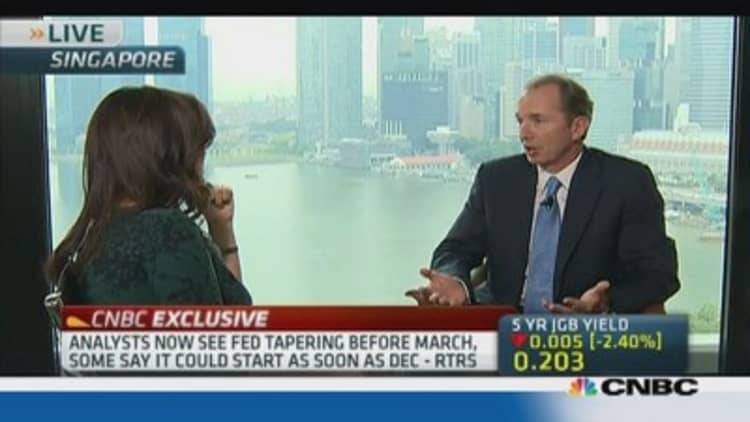Analysts may be giving South Korea and Taiwan the thumbs-up as they benefit from the global recovery but that optimism is not being seen in the equity markets -- and Japan may be to blame.
The view on South Korea and Taiwan has largely turned positive as analysts see the countries export-driven economies as likely beneficiaries of an improving consumption outlook in developed markets. Last week, Goldman Sachs upgraded its investment rating on Taiwan to Overweight and kept its Overweight call on Korea.
But while analysts are broadly positive, it's hard to tell by their equity indexes: Korea's Kospi index is only up around 1 percent this year and while Taiwan's Taiex is up nearly 8 percent year-to-date, it's essentially flat since 2010.
(Read more: Goldman most upbeat on Japan, Europe stocks in 2014)
By contrast, another consensus overweight market, Japan, is up nearly 50 percent this year.
"It's about the currency," said Stephen Sheung, head of investment strategy at wealth manager SHK Private. The yen has weakened significantly since the beginning of the year, with the U.S. dollar now buying more than 101 yen, compared with around 86 yen in early January.
"(Korea and Taiwan) are the two countries that are most similar to Japan in terms of exports. It's about export substitution," Sheung said, adding that notwithstanding Samsung Electronics' success with gadgets, there's a preference for Japanese exports.
(Read more: Are Japan's stocks still ready to rumble?)
"When the yen weakens, you see funds [going to Korea and Taiwan] slow down," he said.
To be sure, Korea and Taiwan have seen some foreign investor flows so far this year. From the start of the year through November 20, foreign investors have put around $4.6 billion into Korean mutual funds and $6.6 billion into Taiwan funds, according to data from Jefferies.
But this is dwarfed by the $17.6 billion foreign investors pushed into Indian mutual funds over the same period, the data show, even though analysts have turned largely negative on India amid concerns about its political stalemate, current account deficit and high inflation.

(Read more: More signs of Japan rebound: Exports soar)
Goldman noted funds in Asia remain biased toward the South, with overweight positions in India and Southeast Asia, while Korea and Taiwan remain underweights.
A rebirth of manufacturing in developed countries such as the U.S. and Japan is reducing inflows into markets such as Korea and Taiwan, said Ed Rogers, at Rogers Investment Advisors, which has around $100 million under management.
"Japan is the most developed country in Asia by far and therefore the primary beneficiary of those inflows," he said. He expects the country will see the lion's share of all inflows into Asia. Foreign investors have poured around $126.5 billion into Japan mutual funds so far this year, according to the data from Jefferies.
(Read more: Goldman tips playing China's cyclical boost)
Rogers also believes the yen's weakness is reducing the attractiveness of exports from Korea and Taiwan, especially when compared with Japan's "brand equity" in manufacturing.
With the yen's weakness sharply reducing costs, exports from Japan only get more attractive, he said.
In addition, Japan's export machine is far more diversified than its competitors', he noted.
"The width and breadth sold from Japan is far broader than Taiwan – it's a two or three trick pony," Rogers said.
He believes Japan is the most interesting Asian story for 2014.
Sheung is also positive on Japan. While he expects more funds to flow into Taiwan and Korea and away from the Southeast Asian and Indian markets, he also expects more yen weakness ahead to damp Japan's neighbors.
He noted Japan is set to increase its consumption tax in April, likely weighing economic activity and potentially triggering even more easing action from Bank of Japan.
—By CNBC.Com's Leslie Shaffer; Follow her on Twitter @LeslieShaffer1

